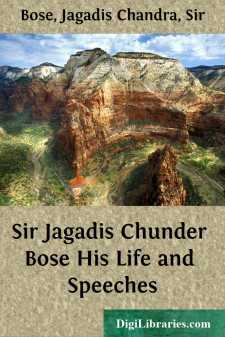Categories
- Antiques & Collectibles 13
- Architecture 36
- Art 48
- Bibles 22
- Biography & Autobiography 813
- Body, Mind & Spirit 142
- Business & Economics 28
- Children's Books 15
- Children's Fiction 12
- Computers 4
- Cooking 94
- Crafts & Hobbies 4
- Drama 346
- Education 46
- Family & Relationships 57
- Fiction 11828
- Games 19
- Gardening 17
- Health & Fitness 34
- History 1377
- House & Home 1
- Humor 147
- Juvenile Fiction 1873
- Juvenile Nonfiction 202
- Language Arts & Disciplines 88
- Law 16
- Literary Collections 686
- Literary Criticism 179
- Mathematics 13
- Medical 41
- Music 40
- Nature 179
- Non-Classifiable 1768
- Performing Arts 7
- Periodicals 1453
- Philosophy 64
- Photography 2
- Poetry 896
- Political Science 203
- Psychology 42
- Reference 154
- Religion 513
- Science 126
- Self-Help 84
- Social Science 81
- Sports & Recreation 34
- Study Aids 3
- Technology & Engineering 59
- Transportation 23
- Travel 463
- True Crime 29
Sir Jagadis Chunder Bose His Life and Speeches
Description:
Excerpt
On the 30th November, 1858, Jagadis Chunder was born, in a respectable Hindu family, which hails from village Rarikhal, situated in the Vikrampur Pargana of the Dacca District, in Bengal. He passed his boyhood at Faridpur, where his father, the late Babu Bhugwan Chunder Bose, a member of the then Subordinate Executive Service was the Sub-Divisional Officer; and it was there that he derived "the power and strength that nerved him to meet the shocks of life."
HIS FATHER
His father was a fine product of the Western Education in our country. Speaking of him, says Sir Jagadis "My father was one of the earliest to receive the impetus characteristic of the modern epoch as derived from the West. And in his case it came to pass that the stimulus evoked the latent potentialities of his race for evolving modes of expression demanded by the period of transition in which he was placed. They found expression in great constructive work, in the restoration of quiet amidst disorder, in the earliest effort to spread education both among men and women, in questions of social welfare, in industrial efforts, in the establishment of people's bank and in the foundation of industrial and technical schools." However, his efforts—like most pioneer efforts—failed. He became overpowered in the struggle. But his young son, who witnessed the struggle, derived a great lesson which enabled him "to look on success or failure as one"—or rather "failure as the antecedent power which lies dormant for the long subsequent dynamic expression in what we call success." "And if my life" says Sir Jagadis "in any way came to be fruitful, then that came through the realisation of this lesson." So great was the influence exerted on him by his father that Sir Jagadis Chunder has observed "To me his life had been one of blessing and daily thanksgiving."
HIS EARLY EDUCATION
Little Jagadis received his first lesson in a village pathsala. His father, who had very advanced views in educational matters, instead of sending him to an English School, which was then regarded as the only place for efficient instruction, sent him to the vernacular village school for his early education. "While my father's subordinates" says Sir Jagadis "sent their children to the English schools intended for gentle folks, I was sent to the vernacular school, where my comrades were hardy sons of toilers and of others who, it is now fashion to regard, were belonging to the depressed classes." Speaking of the effect it produced on him, observes Sir Jagadis "From these who tilled the ground and made the land blossom with green verdure and ripening corn, and the sons of the fisher folk, who told stories of the strange creatures that frequented unknown depths of mighty rivers and stagnant pools, I first derived the lesson of that which constitutes true manhood. From them too I drew my love of nature."
"I now realise" continues Sir Jagadis "the object of my being sent at the most plastic period of my life to the vernacular school where I was to learn my own thoughts and to receive the heritage of our national culture through the medium of our own literature. I was thus to consider myself one with the people and never to place myself in an equivocal position of assumed superiority."
"The moral education which we received in our childhood" adds Sir Jagadis "was very indirect and came from listening to stories recited by the "Kathaks" on various incidents connected with our great epics....



